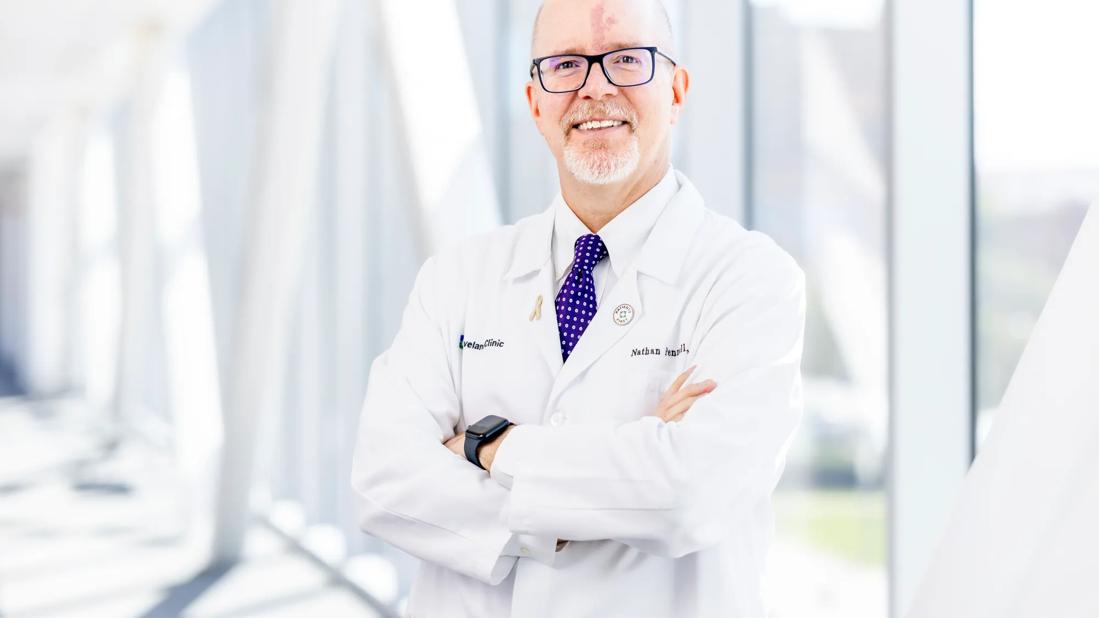More time on drug may be needed

Only about a third of patients diagnosed with non-small cell lung cancer (NSCLC) are eligible for surgery, and many of those patients will relapse. The high metastatic potential of NSCLC, even in its early stages, creates a clinical need for adjuvant treatment to completely remove microscopic residual disease.
Advertisement
Cleveland Clinic is a non-profit academic medical center. Advertising on our site helps support our mission. We do not endorse non-Cleveland Clinic products or services. Policy
One bright spot has been use of erlotinib, a receptor tyrosine kinase inhibitor (TKI), for late-stage NSCLC patients whose tumors have an epidural growth factor receptor (EGFR) mutation. In the U.S., about 15 percent of patients have EGFR-mutant NSCLC. In Asian countries, the percentage of NSCLC patients with the mutation is as high as 50 percent.
Many clinical trials have shown that erlotinib is far more effective for late-stage NSCLC patients with the mutation than chemotherapy. With this in mind, researchers decided to test whether adjuvant erlotinib treatment would improve outcomes in early-stage EGFR-mutant lung cancer.
“Over the last 10 to 15 years, there have been many trials showing drugs like erlotinib are vastly superior to chemotherapy in terms of controlling cancer in patients with stage IV metastatic EFGR-mutant non-small cell lung cancer,” says Nathan A. Pennell, MD, PhD, Hematology and Oncology, Cleveland Clinic.
“So the idea behind our trial was for curable people with early-stage lung cancer that have the EGFR mutation, could we improve their rate of being cured by adding two years of erlotinib?”
Results of SELECT were recently published in the Journal of Clinical Oncology.
The trial consisted of 100 patients enrolled at seven sites between January 2008 and May 2012. Each patient had to have completed resected NSCLC stage IA to IIIA with a sensitizing mutation in EGFR.
Investigators excluded patients who had previously received an EGFR TKI or with evidence of recurrent cancer by CT of the chest, abdomen and pelvis before enrollment.. Patients were also required to have an Eastern Cooperative Oncology Group performance status of 0 to 2.
Advertisement
If adjuvant chemotherapy and radiotherapy were given, surgical resection had to be within nine months of enrollment — six months if only adjuvant chemotherapy was given. Patients were required to have recovered from the toxicities of adjuvant therapy.
Enrolled patients were treated with a 150 mg tablet of erlotinib once per day in continuous monthly treatment cycles for a maximum of two years. Eleven patients stopped erlotinib within the first treatment month due to intolerance, and four patients continued erlotinib after the close of the study because of patient or physician preference.
nail changes,In terms of dose reduction, forty percent of patients required a drop to 100 mg, and 16 percent needed a second drop to 50 mg. Toxicities were typical of erlotinib: rash, fatigue, diarrhea, dry skin, nausea/vomiting, stomatitis, pruritis and transaminitis. One patient had grade 2 pulmonary fibrosis and no grade 4 or 5 events were noted.
In the median follow-up period of 5.2 years, 40 patients recurred and 17 of those died. The primary end point of two-year disease-free survival was 88 percent.
“We designed the study to show there would be fewer recurrences in the first two years in patients treated with erlotinib compared with what we would expect in a similar group of people who were untreated,” says Dr. Pennell. “And there was a fairly impressive improvement in two years of disease-free survival.”
Nevertheless, he said, once patients stopped taking erlotinib, many of them recurred, and by five years, the recurrence rate was about the same as what it would have been without erlotinib.
Advertisement
“I personally don’t believe two years of adjuvant treatment with erlotinib has been shown to improve the rate of cure after surgery for cancer with early-stage mutant EGFR cancer,” says Dr. Pennell.
He is eager to see the results of two other trials, ALCHEMIST, a similar, larger, randomized phase 2 study, and another using a newer TKI drug called osimertinib with a three-year treatment duration.
“My belief is that it is definitely worth trying a longer duration of therapy. Two years may just not have been enough,” says Dr. Pennell. “Between these two trials I’m hopeful that we’ll have a better answer about whether or not this is a good idea.”
Feature image: non-small cell lung cancer after cisplatin treatment. Source: NCI Visuals Online.
Advertisement
Advertisement

Radiation therapy helped shrink hand nodules and improve functionality

Standard of care is linked to better outcomes, but disease recurrence and other risk factors often drive alternative approaches

Phase 1 study demonstrates immune response in three quarters of patients with triple-negative breast cancer

Multidisciplinary teams bring pathological and clinical expertise

Genetic variants exist irrespective of family history or other contributing factors

Study shows significantly reduced risk of mortality and disease complications in patients receiving GLP-1 agonists

Structured interventions enhance sleep, safety and caregiver resiliency in high-acuity units

Addressing rare disease and challenging treatment course in an active young patient